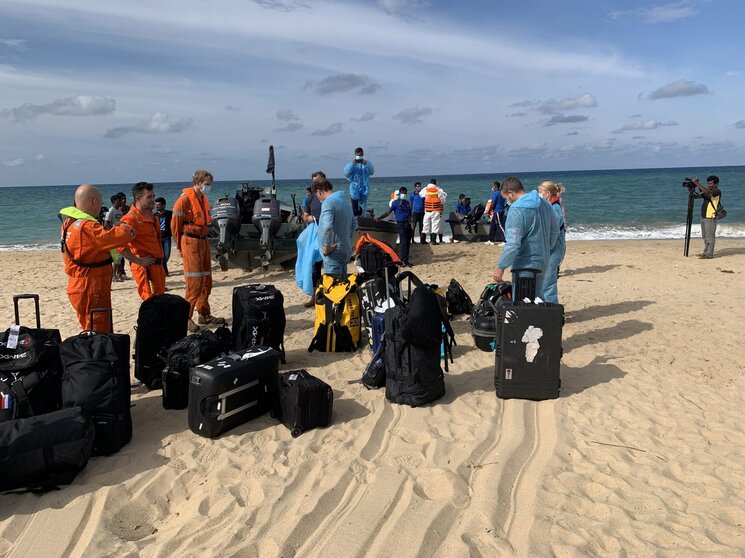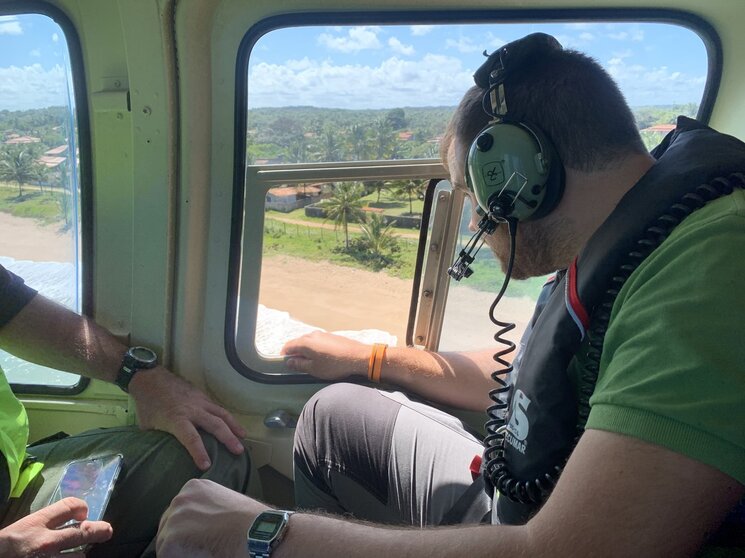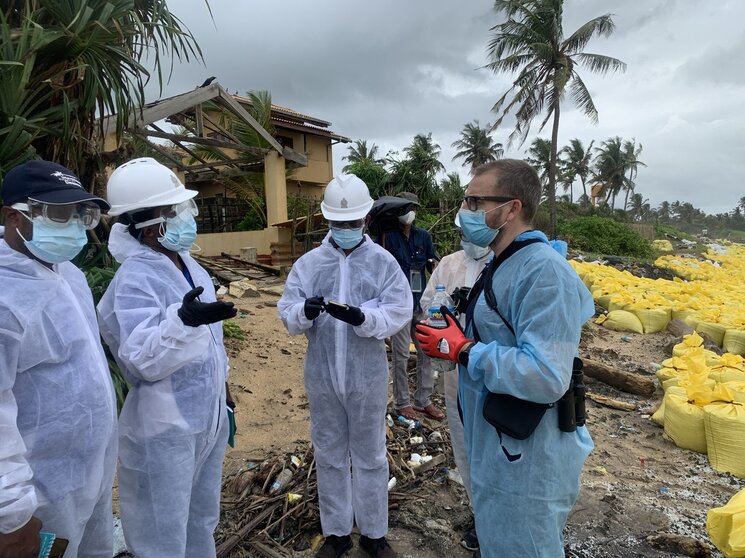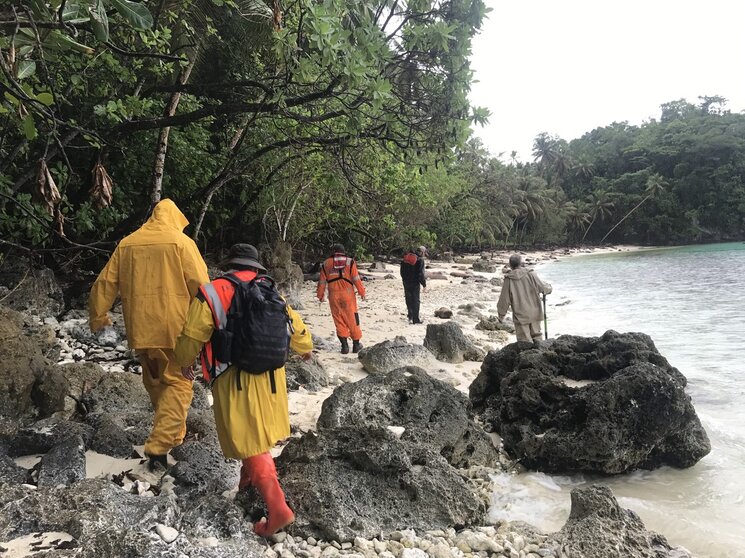Behind the Scenes
The work of an ITOPF Technical Adviser is not easy to describe as no two incidents or days are the same. Here we provide an overview of the role of a Technical Adviser during a spill.
Notification / Evaluation / Mobilisation
When an incident occurs we can be notified in a number of ways, 24 hours a day. Most commonly we will be contacted by the vessel's P&I Club or Lloyds Casualty Reporting Service. We can also be notified by our extensive network of contacts, which include correspondents, surveyors, spill response organisations, government agencies and port authorities.
Read more
Initial Evaluation
If the incident requires our immediate attendance, we will liaise with travel agents or aircraft brokers to determine the quickest and most effective means of getting on site. At the same time, one of our Technical Advisers will make preparations to travel. Since we provide assistance throughout the world from our office in London we pride ourselves in our ability to mobilise rapidly.
At this stage, other staff will gather information and contact key parties in an attempt to build up an accurate picture of the incident so that the Technical Adviser arriving on scene can hit the ground running. We will then carry out a preliminary evaluation of the likely extent of the pollution, its probable behaviour, fate and potential impact on resources and the local capability to respond.
We employ a variety of in-house resources, such as our Membership database, spills attended database, nautical charts, and computer models to predict the fate and behaviour of the oil and/or chemicals involved.
Sensitive resources at risk are identified and mapped using our in-house GIS. Information on weather conditions and local preparedness, such as the availability of contingency plans and equipment stockpiles, are also collated. This gives us a sound basis for understanding how the incident might develop.
Arrival on Site / Aerial Surveillance / Information / Prioritisation
On arrival on site, we are usually met by the P&I Club's local correspondent, who will brief us of any recent developments and will act as an initial guide to the area.
Our role on site will vary according to the circumstances of the incident, but it is important to note that we always act in an advisory capacity, with decisions on the response made by government authorities.
Our main task on site is to work with all relevant parties to provide objective technical advice on the most appropriate clean-up techniques, with the aim of mitigating any damage caused by the spill.
Read More
Command and control is vital in spill response, and early decisions may have a long-standing effect on the response, so we usually try and integrate ourselves into the command centre as quickly as possible.
Aerial Surveillance
One of the best ways to obtain an overall picture of the incident, and to help determine the main response strategies for the scenario in hand, is to undertake an overflight of the damaged vessel, of the oil and of any polluted areas.
From above we can see the quantity and movement of oil on the water, resources at risk and the response activities. Ideally the overflight will be undertaken jointly with the local authorities, so that observations and strategies can be agreed.
A flight plan and on-board communication with the pilot are essential during any overflight. Depending on the country we may be the only experienced spill observers available.
However, political sensitivities or bad weather may prevent flying, in which case this information must be gained by other means, eg remotely or through surveys by boat or on foot.
Sharing Information
Information from overflights is invaluable to responders, so it is essential that this is shared with the command centre as soon as possible. We do this verbally and by preparing maps showing the location of the oil and the main areas at risk in relation to sensitive resources.
We often become involved in high-level strategic discussions with key participants in the response. This can involve working jointly with the authorities to develop technically reasonable clean-up strategies that draw on our past experiences from attending 700 incidents in a large range of local habitats and economies.
Prioritising Advice
Circumstances sometimes mean that not all identified sensitive resources can be protected, either because of a lack of equipment or a lack of time before the arrival of the oil. Prioritising the protection of sensitive resources can be an emotive decision and this is where our objective technical advice can be most valuable, particularly as we are able to base this advice on direct spill experience of the approaches that work effectively on the ground.
The success of a response will largely depend on how much pre-planning has taken place, and understanding the limitations of equipment and the accessibility of locations.
Coordinating the Response / Surveys / Damage Assessment
In many instances, considerable thought and planning will have gone into determining preferred response strategies. Strategies might include monitoring the situation; protecting sensitive resources; at-sea counter-measures such as containment and recovery; use of dispersant or in-situ burning; shoreline clean-up; and waste management. Even the best contingency plans need to be flexible enough to adapt to changing circumstances. Response strategies that were effective at the start of the response may become ineffective or damaging over time.
Read more
ITOPF's Technical Advisers are there to help assess the effectiveness of these strategies and to guide responders towards those most likely to reduce pollution damage. Our team will also provide the technical rationale for the response choices made and so support decision-makers at a time when emotions might be running high.
Surveys
Surveys provide important information to assess the extent of contamination quickly and, if carried out with stakeholders, the opportunity to reach consensus on clean-up techniques and end-points. While aerial surveillance can provide an overview of the areas affected it is usual to verify this information through surveys on foot or by boat. Surveys also provide helpful information on uses of the area and access for clean-up and temporary storage sites for waste.
When on site a considerable amount of our time is spent liaising with local authorities and other stakeholders to help prioritise the clean-up sites, to understand how the response and the clean-up work is progressing, as well as documenting areas that are contaminated and those that are not. Often local teams already have detailed base maps of the area, but in some locations ITOPF survey maps of contaminated shorelines may be the only information available.
Damage Assessment
Depending on the severity of an incident, our work on site may include an investigation of the effects of the contamination on social and economic activities. Most commonly, this involves visiting mariculture facilities to discuss with the operators and regulators the extent of the damage to the facility and to the stock and ways in which the damage can be mitigated. We may also provide advice on the extent to which fishing should be restricted or banned, or on cleaning vessel hulls, sea defences and water intakes.
Our knowledge of the incident, the response strategies used, and the extent of contamination can also facilitate the assessment of claims from the tourist industry.
Termination / Post Spill Monitoring / Claims Assessment
The removal of all traces of contamination from an area may be difficult or inadvisable. One of the greatest challenges we can face on site is advising parties when a particular site is 'clean' and when workers and equipment can be demobilised.
The authorities may require monitoring to determine the extent of contamination over time. We will work with these authorities and research institutions to develop realistic monitoring plans and assist in identifying suitable laboratories for sample analysis. We may also advise on environmental restoration projects to ensure they are realistic and provide a benefit to the affected area.
The organisations, companies and individuals that have spent money in the response, or have suffered a loss due to the oil, may decide to submit a claim to the P&I Club concerned or to other bodies that may be able to provide compensation. Our role on site includes advising potential claimants on the submission of claims. We may also spend considerable time after the response has concluded advising on the technical merits of these claims from our office.




